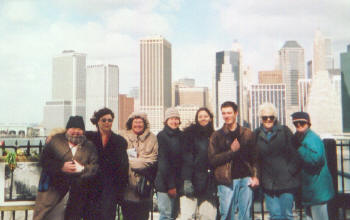|
America’s Writers: Taking Transcendentalism Beyond New England
|
|
Having visited Walt’s beloved home city, New York, and having stood in Brooklyn looking over into Manhattan as he would have so many times, we definitely caught the Whitman bug. From our travels in New England and New York, we branched out in our reading to encompass the entire United States. Walt was right: The United States are the world’s greatest poem! After studying the core Transcendentalists, we plunged into nature writing, environmental writing, and other artistic responses to the United States and its natural beauty. In many ways, these writers and artists inspired us even more than the Transcendentalists themselves. We
looked at the roots of exploration in the United States, considering Lewis
& Clark, John Wesley Powell, and several other key figures. From
these early nineteenth-century explorers, we delved into the western writers
of the late nineteenth century, writers such as John Muir and Clarence King. Tiffany
was inspired to write about King and his discoveries. As we
moved into the twentieth century to consider the rise of environmentalism and
the commitment to political activism, we were deeply moved by the pioneering
work of Aldo Leopold. Cat
was captivated – from the beginning of the course until the very end – with
the life and work of Rachel Carson. One writer who provided an excellent journaling model for all of us was Annie Dillard. We read portions of her famed book, Pilgrim at Tinker Creek, and had great fun taking on “Dillard perspectives” throughout the semester. Sarah and Cat especially enjoyed Annie Dillard. Lizzie
was so moved by Terry Tempest Williams’s account of women survivors of breast
cancer that she wrote an open letter to the author. Read
Lizzie's response to “The Clan of One-Breasted Women” (an excerpt
from Williams’s classic memoir, Refuge). Patricia
found that some of the contemporary nature writers spoke to her as well. Read
Patricia’s thoughts on Appalachian writer Wendell Berry. Patricia
enjoys an ever-deepening literary communion with moose, and you’ll want to be
sure to read her thoughts on Trudy Ditmar’s
essay about this elusive animal. And finally, some of these writers inspired us to observe our own worlds closely and attentively. Read Lizzie’s poem, “Mrs. Beetle's Plight,” see Dan’s sketch of his dog, and read Paul’s poems, “Grow,” “Summer Attraction,” and “The Shepherd's Tune.” |
|
“American Transcendentalism: An Online Travel Guide” was produced by students in ENGL 446, American Transcendentalism, and ENGL 447, American Literature and the Prominence of Place: A Travel Practicum. These courses were team-taught in the Department of English at Shepherd College (now Shepherd University), Shepherdstown, West Virginia, in Spring 2002 by Dr. Patricia Dwyer and Dr. Linda Tate. For more information on the course and the web project, visit “About This Site.” © 2003 Linda Tate. |
